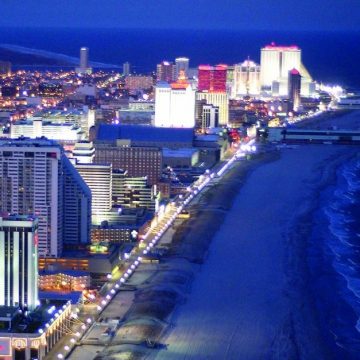
New Jersey’s Division of Gaming Enforcement hopes to make player liquidity deals with Nevada and Pennsylvania. Longtime DGE Director David Rebuck says New Jersey gaming laws ties his agency’s hands in making an interstate poker compact, though.
Since New Jersey rolled out online poker in November 2013, it has become axiomatic that the state’s leaders do not want to share player liquidity with Nevada and Delaware. That is not necessarily the case, says Rebuck, who has negotiated with Nevada and the United Kingdom on sharing poker players.
New Jersey Online Poker Laws
Rebuck says New Jersey Internet poker laws remain an obstacle. He said, “If those states will not allow their gaming servers for online gaming to be here, we really are kind of stuck, unless there is a legislative change. We’re not in a very strong position to effectuate liquidity with those restrictions.”
Under New Jersey’s online poker law, only licensed operators who house their online servers in Atlantic City can offer their services to New Jersey gamblers. To make a deal with Nevada or Delaware, who already have a player liquidity agreement, those states would have to agree to allow their gaming operators to house their websites in Atlantic City. As one might imagine, that is unlikely.
Laws Undermined UK Player Liquidity Deal
That stipulation killed a deal the Division of Gaming Enforcement had in place with the United Kingdom. In June 2016, Rebuck hinted New Jersey and the UK had an “agreement in principle” to share player liquidity.
In a recent interview with Global Gaming Business, the DGE director insists he had an “very serious” negotiation with the UK Gambling Commission that would have led to a “massive increase” in player liquidity for New Jersey.
Rebuck told Global Gaming, “We just couldn’t pull it off. Our law is very restricted in that the gaming servers, the actual gaming servers that allow for the outcome of the game to be determined, have to be in Atlantic City, and that’s just not a business model that they were willing to adopt.”
“A Lot of Factors in Online Gambling”
New Jersey’s top regulatory official for gambling said, “There are a lot of factors involved in online gaming, and it’s just not a matter of flipping a switch and saying, ‘we’re going to turn on the Internet today.'”
A deal with the United Kingdom never made much sense. To have been legal under the UIGEA, the UK would have had to forego playing with international operators like PokerStars.com. Giving up a vast network of international poker sites for New Jersey’s 9 million potential gamblers was not a realistic option.
Nevada-Delaware Online Poker Compact
Partnering with Nevada and Delaware is realistic, but those states would have to make concessions to accommodate New Jersey. Since they are smaller states that need more player liquidity, it is possible gaming regulators in those jurisdictions might agree to such stipulations — though not probable.
Pennsylvania Online Poker
Pennsylvania is another matter. Most media sources and US online gaming analysts believe Pennsyvlania will legalize and regulate online poker in the Fall of 2017. If so, its large population would be a boon to New Jersey’s online poker industry, if the two states were to share player pools. Pennsylvania is not likely to sign an interstate poker compact if its sites have to use servers in Atlantic City, though. In this case, Pennsylvania would be the bigger state and New Jersey gaining the better deal.
The ulimate goal for poker players in any of the four states would be to see all four sign onto the interstate poker compact already in place between Delaware and Nevada. If that is to happen, New Jersey’s lawmakers would need to change its online poker laws to accommodate a player liquidity agreement. Whether that is possible is unknown.
Changes to New Jersey’s iPoker Law?
New Jersey’s legislators tend to be pro-gambling, so David Rebuck and Atlantic City online poker operators might be able to convince them to change the law. Once Pennsyvlania approves online poker, one can expect to hear talk of a change to New Jersey’s online poker server law to heat up.















